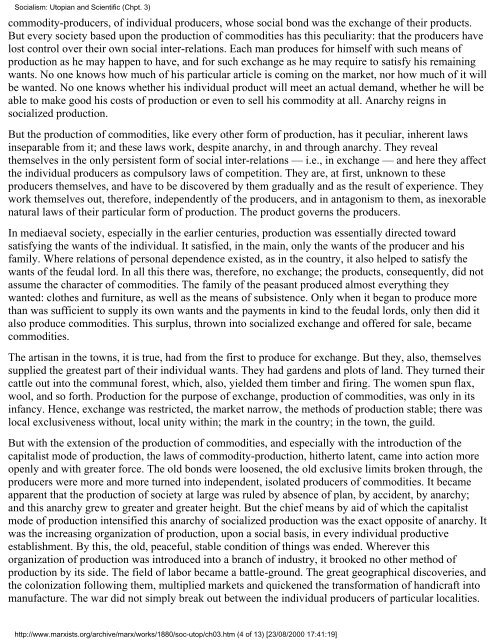Socialism: Utopian and Scientific - MIA
Socialism: Utopian and Scientific - MIA
Socialism: Utopian and Scientific - MIA
Create successful ePaper yourself
Turn your PDF publications into a flip-book with our unique Google optimized e-Paper software.
<strong>Socialism</strong>: <strong>Utopian</strong> <strong>and</strong> <strong>Scientific</strong> (Chpt. 3)commodity-producers, of individual producers, whose social bond was the exchange of their products.But every society based upon the production of commodities has this peculiarity: that the producers havelost control over their own social inter-relations. Each man produces for himself with such means ofproduction as he may happen to have, <strong>and</strong> for such exchange as he may require to satisfy his remainingwants. No one knows how much of his particular article is coming on the market, nor how much of it willbe wanted. No one knows whether his individual product will meet an actual dem<strong>and</strong>, whether he will beable to make good his costs of production or even to sell his commodity at all. Anarchy reigns insocialized production.But the production of commodities, like every other form of production, has it peculiar, inherent lawsinseparable from it; <strong>and</strong> these laws work, despite anarchy, in <strong>and</strong> through anarchy. They revealthemselves in the only persistent form of social inter-relations — i.e., in exchange — <strong>and</strong> here they affectthe individual producers as compulsory laws of competition. They are, at first, unknown to theseproducers themselves, <strong>and</strong> have to be discovered by them gradually <strong>and</strong> as the result of experience. Theywork themselves out, therefore, independently of the producers, <strong>and</strong> in antagonism to them, as inexorablenatural laws of their particular form of production. The product governs the producers.In mediaeval society, especially in the earlier centuries, production was essentially directed towardsatisfying the wants of the individual. It satisfied, in the main, only the wants of the producer <strong>and</strong> hisfamily. Where relations of personal dependence existed, as in the country, it also helped to satisfy thewants of the feudal lord. In all this there was, therefore, no exchange; the products, consequently, did notassume the character of commodities. The family of the peasant produced almost everything theywanted: clothes <strong>and</strong> furniture, as well as the means of subsistence. Only when it began to produce morethan was sufficient to supply its own wants <strong>and</strong> the payments in kind to the feudal lords, only then did italso produce commodities. This surplus, thrown into socialized exchange <strong>and</strong> offered for sale, becamecommodities.The artisan in the towns, it is true, had from the first to produce for exchange. But they, also, themselvessupplied the greatest part of their individual wants. They had gardens <strong>and</strong> plots of l<strong>and</strong>. They turned theircattle out into the communal forest, which, also, yielded them timber <strong>and</strong> firing. The women spun flax,wool, <strong>and</strong> so forth. Production for the purpose of exchange, production of commodities, was only in itsinfancy. Hence, exchange was restricted, the market narrow, the methods of production stable; there waslocal exclusiveness without, local unity within; the mark in the country; in the town, the guild.But with the extension of the production of commodities, <strong>and</strong> especially with the introduction of thecapitalist mode of production, the laws of commodity-production, hitherto latent, came into action moreopenly <strong>and</strong> with greater force. The old bonds were loosened, the old exclusive limits broken through, theproducers were more <strong>and</strong> more turned into independent, isolated producers of commodities. It becameapparent that the production of society at large was ruled by absence of plan, by accident, by anarchy;<strong>and</strong> this anarchy grew to greater <strong>and</strong> greater height. But the chief means by aid of which the capitalistmode of production intensified this anarchy of socialized production was the exact opposite of anarchy. Itwas the increasing organization of production, upon a social basis, in every individual productiveestablishment. By this, the old, peaceful, stable condition of things was ended. Wherever thisorganization of production was introduced into a branch of industry, it brooked no other method ofproduction by its side. The field of labor became a battle-ground. The great geographical discoveries, <strong>and</strong>the colonization following them, multiplied markets <strong>and</strong> quickened the transformation of h<strong>and</strong>icraft intomanufacture. The war did not simply break out between the individual producers of particular localities.http://www.marxists.org/archive/marx/works/1880/soc-utop/ch03.htm (4 of 13) [23/08/2000 17:41:19]














![tyf Enf=O=n]lgg](https://img.yumpu.com/47584932/1/190x245/tyf-enfonlgg.jpg?quality=85)

